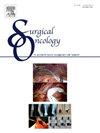Impact of the completeness of cytoreductive surgery on the prognostic role of the KELIM score in patients treated for ovarian peritoneal metastasis
IF 2.4
4区 医学
Q3 ONCOLOGY
引用次数: 0
Abstract
Introduction
The two major treatment related prognostic factors for peritoneal metastasis of ovarian cancer (PMOC) are chemosensitivity and completeness of cytoreduction (CC). Chemosensitivity can be assessed by the CA-125 elimination rate constant K (KELIM) score, based on CA-125 kinetics. CC is evaluated by residual macroscopic disease. The aim of this study was to evaluate the prognostic impact of KELIM score versus CC, in a population who underwent complete (CC-0) and near-complete (CC-1) debulking.
Materials and methods
Monocentric retrospective study including patients with primary PMOC treated with curative intent between January 2010 and December 2021. The Biomarker Kinetics website (CA-125 KELIM Calculator) was used to calculate the KELIM score. Univariate and multivariate analysis were performed to assess the impact of CC and KELIM score on PFS and OS.
Results
A total of 111 patients were included in the study. Kaplan-Meier analysis showed that PFS and OS were significantly influenced by KELIM, CC, PCI, and BRCA mutation (p < 0.05). Multivariate Cox analysis showed that PFS was significantly influenced by CC (HR = 0.481, p = 0.0027), while OS was influenced by KELIM (HR 0.561, p = 0.0408).
Conclusion
These results suggest that PFS is more impacted by the completeness of the surgery than the KELIM score and the KELIM score influences OS more than the completeness of surgery.
在卵巢腹膜转移患者治疗中,细胞减少手术的完全性对KELIM评分的预后作用的影响
卵巢癌腹膜转移(PMOC)的两个主要治疗相关预后因素是化疗敏感性和细胞减少完整性(CC)。化疗敏感性可以通过基于CA-125动力学的CA-125消除速率常数K (KELIM)评分来评估。CC是通过残留的肉眼病变来评估的。本研究的目的是评估KELIM评分对完全(CC-0)和接近完全(CC-1)减积人群的预后影响。材料和方法单中心回顾性研究,纳入2010年1月至2021年12月期间以治愈为目的治疗的原发性PMOC患者。使用生物标志物动力学网站(CA-125 KELIM计算器)计算KELIM评分。采用单因素和多因素分析评估CC和KELIM评分对PFS和OS的影响。结果共纳入111例患者。Kaplan-Meier分析显示,klim、CC、PCI和BRCA突变对PFS和OS有显著影响(p <;0.05)。多因素Cox分析显示,CC对PFS有显著影响(HR = 0.481, p = 0.0027), KELIM对OS有显著影响(HR = 0.561, p = 0.0408)。结论手术完整性对PFS的影响大于KELIM评分,KELIM评分对OS的影响大于手术完整性。
本文章由计算机程序翻译,如有差异,请以英文原文为准。
求助全文
约1分钟内获得全文
求助全文
来源期刊

Surgical Oncology-Oxford
医学-外科
CiteScore
4.50
自引率
0.00%
发文量
169
审稿时长
38 days
期刊介绍:
Surgical Oncology is a peer reviewed journal publishing review articles that contribute to the advancement of knowledge in surgical oncology and related fields of interest. Articles represent a spectrum of current technology in oncology research as well as those concerning clinical trials, surgical technique, methods of investigation and patient evaluation. Surgical Oncology publishes comprehensive Reviews that examine individual topics in considerable detail, in addition to editorials and commentaries which focus on selected papers. The journal also publishes special issues which explore topics of interest to surgical oncologists in great detail - outlining recent advancements and providing readers with the most up to date information.
 求助内容:
求助内容: 应助结果提醒方式:
应助结果提醒方式:


